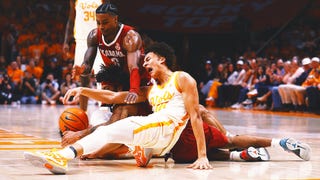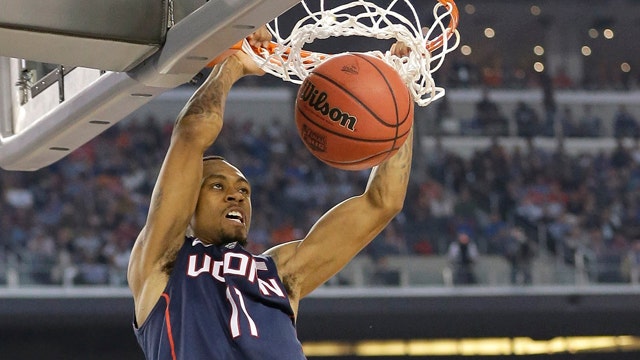NCAA men's basketball title game to make history
7 seed to face 8 seed for first time in championship
ARLINGTON, Texas – Ryan Boatright plays defense like a personal-space-invading bully, getting into his opponent's chest, bumping him around, chopping at his arms, tangling up his feet.
It can be uncomfortable, infuriating, definitely disruptive -- and that's just the way the UConn junior guard likes it.
"I know going into the game if I can make him uncomfortable and irritate him, to any point, or get him fatigued, it's going to lead to mistakes," Boatright said.
Boatright has done plenty of that so far in the NCAA tournament, helping put the Huskies within one win of their fourth national championship.
At 6-foot, 168 pounds, the versatile guard is often one of the smallest players on the court. He makes up for it with tenacity and a strength well beyond his size, muscling opposing point guards out of position and their comfort zones.
Boatright was at his disruptive best in the national semifinals Saturday night in a 63-53 win over Florida, hounding Gators point guard Scottie Wilbekin into his worst offensive game of the season.
Fighting over screens like it meant his survival and practically gluing his chest to Wilbekin's, Boatright helped hold the SEC's player of the year to four points on 2-of-9 shooting while committing three turnovers. Wilbekin had to battle through cramps in the Final Four game, but Boatright's tenacity may have had something to do with that, too.
Overall, Florida had 11 turnovers and just three assists -- just one coming after the opening two baskets of the game.
"That's crazy," Wilbekin said. "That's not usually what we do. All credit goes to them and their guards and the way they were denying and putting pressure on us."
The victory over the Gators put UConn in the national championship game Monday night against Kentucky, a chance to win the program's fourth title on the line.
Boatright has gone through some difficult times to get here.
Early in his career, he was talented but inconsistent and sometimes stubborn, not always willing to do what the coaches wanted without a fight.
In January, his cousin, 20-year-old Arin Williams, was shot to death in Boatright's hometown of Aurora, Ill. The cousins grew up in the same household and were like brothers, so the news hit Boatright hard and he went through a funk.
"As much as I love playing basketball, I just didn't care anymore," he said.
Eventually, Boatright got through it and went back to teaming with 6-1 Shabazz Napier in the nation's best small-guy backcourt.
Napier has been the unquestioned leader of this team, but Boatright's versatility has allowed the senior to do what he does.
Both guards can play either position and spend time in practice learning the demands of both. When Napier runs the point, Boatright easily slides into the shooting guard spot. If Napier is out of the game or playing the 2-guard, Boatright seamlessly runs the show.
Boatright averages 12 points, 3.3 assists and 3.2 rebounds, and has had some big games in the NCAA tournament, including 13-point, six-rebound performance against Florida.
"Ryan Boatright has done a 360," UConn coach Kevin Ollie said. "If anybody had seen him his sophomore year to know, it's like night and day, him being a facilitator, making people better. That's what you do. That's how you mature as a basketball player, that's how you mature as a man."
Next up for Boatright is a huge challenge: Stopping Kentucky's athletic twin guards, Aaron and Andrew Harrison.
They've been a handful for teams throughout the NCAA tournament, particularly Aaron, who has hit game-winning shots in three straight games, including a long 3-pointer with 5.7 seconds left to knock off Wisconsin in the national semifinals.
"I ain't going to reveal all my secrets, but I'm going to do my best to turn them up and down the floor, try to make them uncomfortable," Boatright said. "(I'll) just try to get up in them and be a little physical with them."
Boatright has been successful with the approach so far in the NCAA tournament. If he can do it again against Kentucky, the Huskies could be NCAA champions again.









































